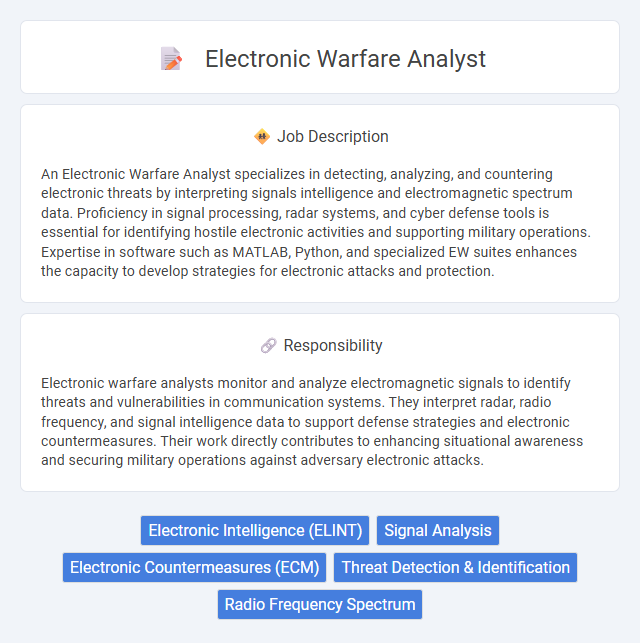
An Electronic Warfare Analyst specializes in detecting, analyzing, and countering electronic threats by interpreting signals intelligence and electromagnetic spectrum data. Proficiency in signal processing, radar systems, and cyber defense tools is essential for identifying hostile electronic activities and supporting military operations. Expertise in software such as MATLAB, Python, and specialized EW suites enhances the capacity to develop strategies for electronic attacks and protection.
Individuals with strong analytical skills, attention to detail, and the ability to work under pressure will likely find electronic warfare analyst roles suitable. Those who thrive in dynamic, high-stakes environments and possess a deep interest in technology and defense systems probably have a higher chance of success. People with difficulty handling stress or lacking technical aptitude may face challenges adapting to the demands of this job.
Qualification
An electronic warfare analyst requires a strong background in electrical engineering, computer science, or a related technical field, often supported by a bachelor's degree. Proficiency in radar systems, signal analysis, electromagnetic spectrum management, and familiarity with defense technologies is essential. Security clearance and experience with intelligence or military operations enhance qualification in this specialized role.
Responsibility
Electronic warfare analysts monitor and analyze electromagnetic signals to identify threats and vulnerabilities in communication systems. They interpret radar, radio frequency, and signal intelligence data to support defense strategies and electronic countermeasures. Their work directly contributes to enhancing situational awareness and securing military operations against adversary electronic attacks.
Benefit
An electronic warfare analyst role likely offers significant benefits such as enhanced technical skills in signal intelligence and radar systems, increasing career marketability in defense and cybersecurity sectors. The position may provide access to advanced technology and continuous learning opportunities, fostering professional growth and expertise development. Employees might also receive competitive salaries, security clearance advantages, and collaboration experience with military and intelligence agencies.
Challenge
The role of an electronic warfare analyst is likely to involve navigating complex and rapidly evolving threat environments, which requires continuous adaptation and deep technical expertise. The challenge may stem from the need to interpret vast amounts of electronic signals and assess potential adversaries' capabilities under time-sensitive conditions. Analysts probably face high pressure to provide accurate, actionable intelligence to support critical defense decisions.
Career Advancement
Electronic warfare analysts develop critical skills in signal intelligence, threat assessment, and countermeasure strategies, which pave the way for rapid career progression within defense and intelligence agencies. Mastery of advanced electronic systems and cyber warfare techniques enhances opportunities for leadership roles, including project management and strategic operations planning. Certification in cybersecurity and continued education in emerging technologies significantly boost promotion prospects and salary potential in this high-demand field.
Key Terms
Electronic Intelligence (ELINT)
Electronic warfare analysts specializing in Electronic Intelligence (ELINT) collect, analyze, and interpret electromagnetic signals to identify and assess enemy radar systems and communication networks. They utilize advanced signal processing tools and intelligence databases to provide actionable insights that support military operations and electronic attack strategies. Expertise in spectrum management, signal detection, and threat analysis is critical for enhancing situational awareness and maintaining electronic dominance.
Signal Analysis
Electronic warfare analysts specializing in signal analysis interpret and exploit electromagnetic signals to identify potential threats and vulnerabilities in communication systems. They utilize advanced software tools and signal processing techniques to detect, classify, and track radar, radio, and other electronic emissions in real time. Proficiency in spectrum management, signal intelligence (SIGINT), and electronic attack (EA) strategies is essential for optimizing threat detection and defense capabilities.
Electronic Countermeasures (ECM)
An Electronic Warfare Analyst specializing in Electronic Countermeasures (ECM) assesses and develops techniques to disrupt, deceive, or neutralize enemy radar and communication systems. This role involves analyzing signal patterns, deploying jamming technologies, and optimizing ECM systems to protect military assets from electronic threats. Expertise in radar signal processing, electronic attack methods, and adaptive countermeasure strategies is essential for enhancing operational effectiveness.
Threat Detection & Identification
Electronic warfare analysts specialize in detecting and identifying enemy radar signals, electronic emissions, and communication patterns to protect military operations from hostile threats. They utilize advanced signal processing techniques, electronic intelligence (ELINT), and real-time data analysis to pinpoint and classify potential electronic threats in complex electromagnetic environments. Proficiency in spectrum management and electronic signal interpretation is critical for ensuring accurate threat assessment and timely response in electronic warfare scenarios.
Radio Frequency Spectrum
An Electronic Warfare Analyst specializing in the Radio Frequency (RF) Spectrum evaluates, monitors, and interprets RF signals to identify potential threats and unauthorized transmissions. They utilize advanced signal processing techniques and spectrum analysis tools to detect, classify, and mitigate electronic warfare threats within the electromagnetic environment. Proficiency in RF spectrum management, signal intelligence (SIGINT), and electronic attack/countermeasure systems is critical for optimizing operational effectiveness and safeguarding communication channels.
 kuljobs.com
kuljobs.com